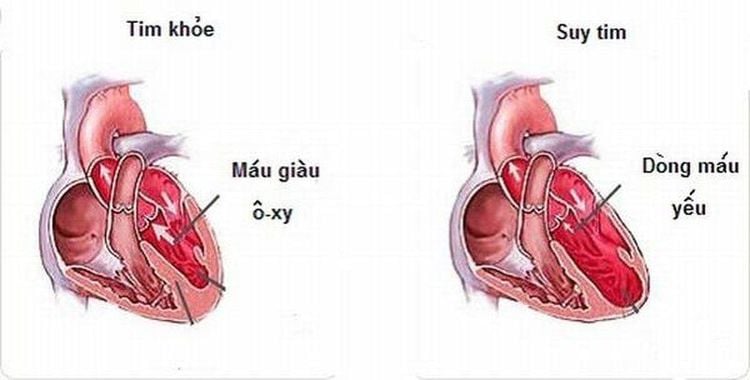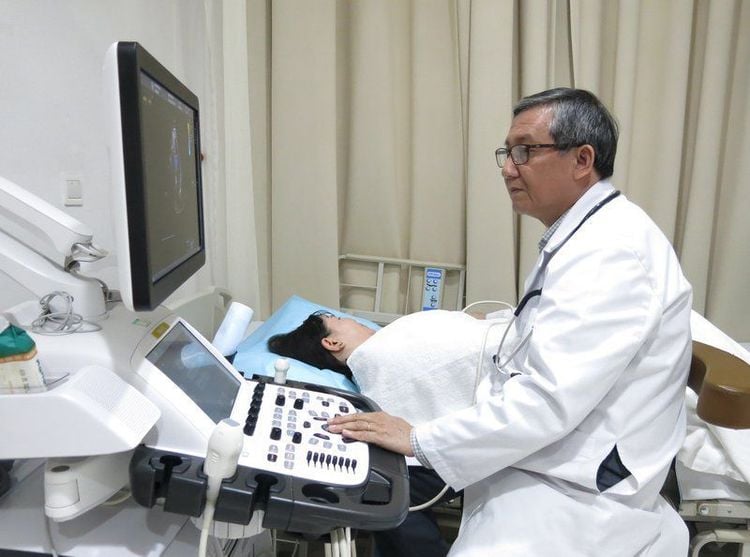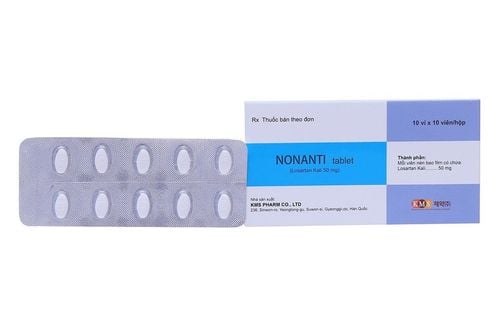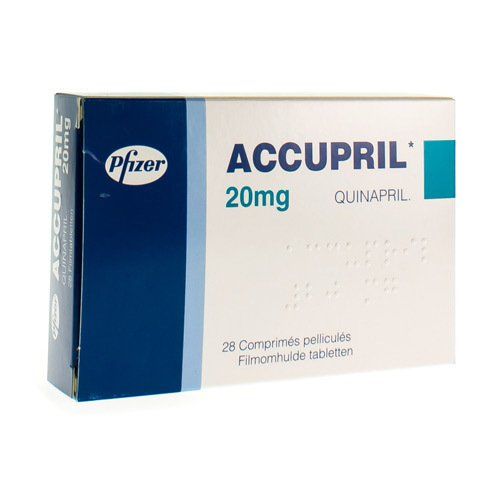This is an automatically translated article.
Up to 50% of patients with heart failure die after 5 years. The worrying thing is that this dangerous disease is increasing rapidly. Understanding heart failure is the best way for you to know how to prevent disease effectively and protect the health of yourself and your loved ones.1. What is heart failure?
We can imagine the heart as a pump that expands to receive blood and contracts to pump blood to feed the body. Heart failure is when the heart's ability to relax to receive blood is reduced (diastolic heart failure) or reduced ability to contract (systolic heart failure), leading to a decrease in the amount of blood needed to feed the body and blood stagnation in the lungs and lungs. peripheral.2. Symptoms of heart failure
Symptoms of heart failure manifest depending on the severity of the disease, from subtle to severe.
Due to reduced blood flow to the body, patients are often tired, weak, or faint, resistance to pathogens is reduced, susceptible to diseases such as pneumonia, bronchitis, flu, ...
Due to stagnation of blood in the lungs, patients often have difficulty breathing. Shortness of breath is the most common symptom of heart failure. In the early stages, when heart failure is mild, shortness of breath occurs only with great exertion: quickly climbing 2-3 flights of stairs, jogging a few hundred meters, walking uphill, etc.
Then, when heart failure worsens, shortness of breath occurs even when doing common tasks such as dressing, taking short walks, even light physical movements, making it difficult to breathe. The most severe is acute left heart failure with severe shortness of breath, cyanosis, coughing up pink foam (acute pulmonary edema), which requires urgent and aggressive treatment to be cured. To assess the degree of dyspnea, the world agreed to use the New York Heart Association (NYHA) grading system, with 4 levels from NYHA I to NYHA IV.
Also due to stagnation of blood in the lungs, patients often have a dry cough, when listening to the lungs, they often hear moist rales in the lungs.
Due to peripheral stagnation, the patient may have edema in the legs or effusion in the pleura, peritoneum, and pericardium. The liver is enlarged and painful, and the veins in the neck are often dilated.
In addition, signs of heart failure also include arrhythmias, causing palpitations, worsening heart failure. The most common arrhythmia in patients with heart failure is atrial fibrillation, also known as complete arrhythmia. The most severe are episodes of ventricular tachycardia, ventricular fibrillation leading to death.

Hình ảnh tim bình thường và suy tim
3. Causes of heart failure
Heart failure is the result of many diseases. The most common causes are hypertension, ischemic heart disease, valvular diseases, congenital heart diseases, dilated cardiomyopathy, alcoholism, myocarditis, arrhythmias, diabetes, hyperthyroidism , autoimmune disease, perinatal heart disease (heart failure occurs to the mother a few weeks before and a few weeks after childbirth),...4. Heart failure treatment
The main endpoints of heart failure treatment are prolonging life, improving quality of life (reducing symptoms and reducing hospitalizations). To meet those criteria, heart failure treatment must be comprehensive, including:
4.1. Lifestyle adjustment
Low salt diet. When heart failure worsens, decompensation, then follow an absolute salt diet for about 1-2 weeks. Quit smoking, alcohol and other stimulants. Do the right job: Avoid strenuous jobs. Suitable exercise: Bodybuilding exercise, tai chi. Patients with mild heart failure (NYHA I, II) can practice cycling, swimming, walking. But no matter what subject you practice, you need to remember one thing: do not exert yourself. Participate in activities and entertainment at associations and clubs to enhance optimism and avoid negative pessimism.
4.2. Drug treatment
Drugs that have been shown in clinical trials to be effective in the treatment of heart failure (if there are no contraindications) are:
ACE inhibitors and angiotensin II receptor blockers . Sacubitril + Valsartan: drug Uperio. Some β-blockers: Bisoprolone; Metoprolone; Carvedilone, Nebivolone. Aldosterone antagonists. Ivabradine. In addition, depending on the clinical situation, some other drugs are also used: Diuretic in case of congestive heart failure (edema, hepatomegaly, moist rales in the lungs), Digoxine and vitamin K antagonist in the presence of atrial fibrillation, nitrate and vasopressor. in acute heart failure,...
4.3. Advanced techniques
When heart failure worsens, poor response to medical treatment. The following techniques can be applied: Left ventricular resynchronization (CRT), automatic defibrillator (ICD), left ventricular assist device (LVAD), heart transplantation, and most recently, artificial heart. create the whole. These techniques have not been widely implemented in Vietnam due to the need for specialized equipment and technical qualifications, and especially because the cost is still very high compared to the economic ability of the patient. Particularly with the technique of heart transplant, there is another obstacle, that is, the source of heart donation is still very rare. Therefore, the most appropriate and effective treatment strategy for heart failure is still early detection and monitoring, strict adherence to treatment, while raising awareness and taking measures to prevent heart failure. This is very important.

Phát hiện sớm và theo dõi bệnh là chiến lược điều trị suy tim thích hợp nhất
5. How to prevent heart failure?
First of all, must have a healthy lifestyle: No tobacco, no alcohol abuse, no stimulants. Exercise and moderate sports, rest and relax, avoid a stagnant lifestyle.
Periodic health check-ups, periodical cardiology examinations for early detection and proper treatment of heart failure complications, as well as for effective management and treatment of heart failure.
The most important thing is early detection and good management and treatment of diseases that can lead to heart failure as mentioned in part 3 above. Especially hypertension, ischemic heart disease, and diabetes are diseases that tend to increase in Vietnam. Some diseases that cause heart failure can be completely treated with surgery: valvular heart disease, congenital heart disease.
Cardiovascular Center, Vinmec Times City Hospital is a specialized heart failure clinic organized and put into operation from March 2019. This is one of the few specialized heart failure clinics built early in Vietnam with reference to the models of the US and Singapore, bringing hope of effective treatment for patients with heart failure.
Please dial HOTLINE for more information or register for an appointment HERE. Download MyVinmec app to make appointments faster and to manage your bookings easily.













